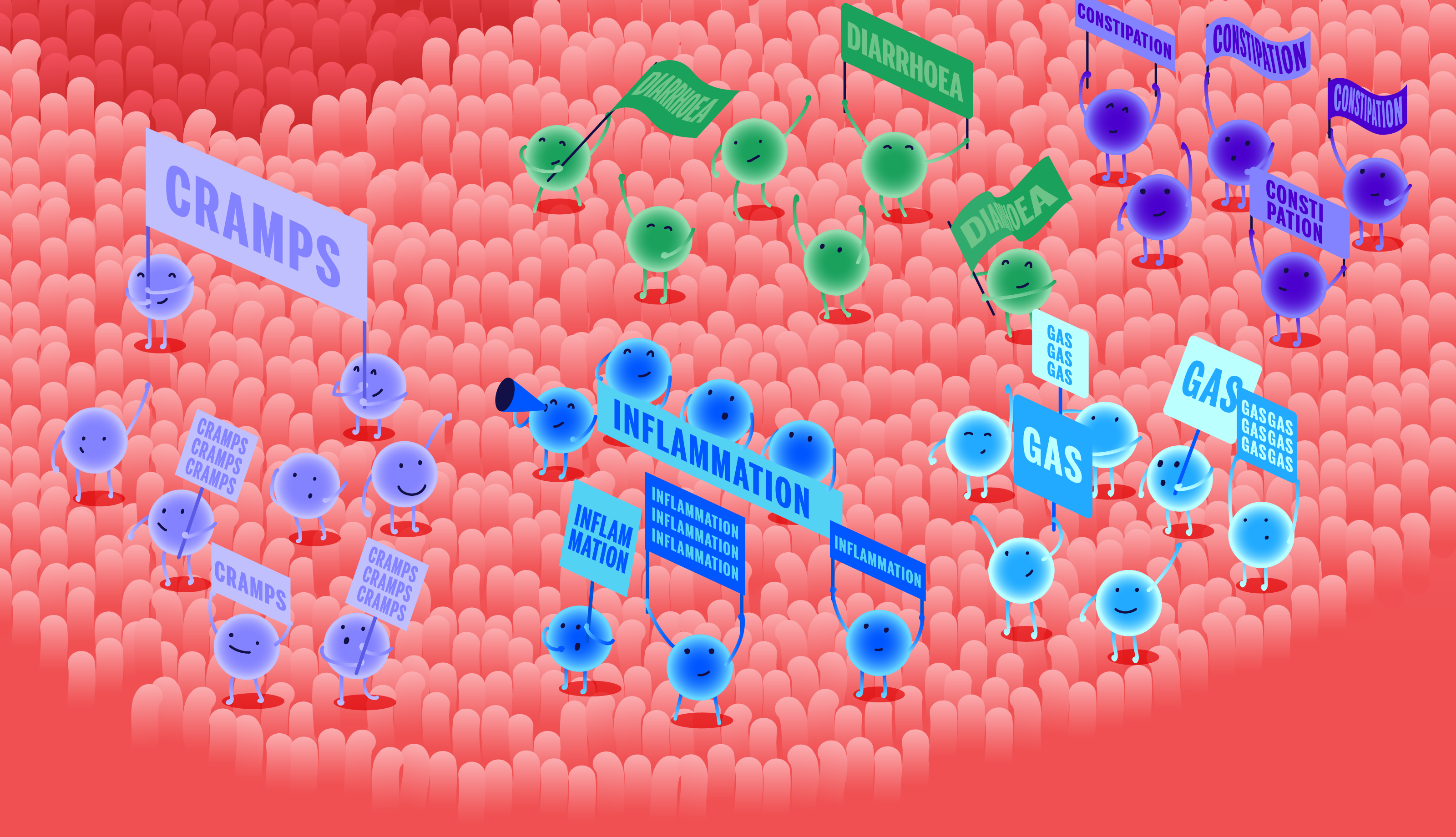Ageing doesn't just happen to the human body, it affects the gut microbiome too. Here's what the science says so far, and what you can do about it.
A healthy gut is populated by numerous species of bacteria. Collectively termed the microbiome (or microbiota), these organisms supply us with various nutrients that are important for the body.
Because we rely on gut bacteria, changes in the microbiome can have a positive or a negative effect on our health and quality of life. The gut's bacterial environment depends on many factors, including genes, eating habits, and lifestyle choices.
Table of contents
- 1. Age shapes the microbiome
- 2. Microbial diversity and aging
- 3. Diet shapes your gut microbes
- 4. Reduced mobility and care
- 5. Weakened immunity with age
- 6. Medication and illness
- 7. Geography and centenarians
Unfortunately, as we age, our microbiome does too. Of course, the bacteria themselves do not become old. Instead, the healthy microbes are gradually getting swapped with those that can cause an illness.
Thanks to advances in modern medicine, we are living longer than ever. But with age also comes illness, and we need to understand what's causing this. As the microbiome plays an important role in health, that's what we'll discuss today.
Age shapes the microbiome
The microbiome and immunity of adults are built under the influence of many early life factors. Indeed, diet, hygiene, siblings, pets, allergies, childhood illnesses, and antibiotics are some prominent factors that affect the microbiome in childhood.
However, gut bacteria are never static. Some lifestyle factors continue to influence this environment after puberty. Throughout adulthood, the gut microbial ecosystem adapts and responds to things that happen to our bodies.
Microbial diversity in later years
The decline in microbiome diversity that occurs with age may be a consequence of several lifestyle changes.
By the time a person reaches 60 years old, their gut microbiome is no longer the same. The bacteria inside it become less diverse, and beneficial microbes, like Lactobacillus, and Bifidobacterium, lose ground.
Instead, there is an increase in enterobacteria populations. These bacteria are called opportunistic, because they can cause an infection when given the opportunity, like when the gut’s bacterial balance is disrupted by antibiotics.
Diet, exercise, illness and medication influence health at every age
Gut dysbiosis is linked to increased risk of several chronic diseases. While it can be hard to know whether an unbalanced microbiome is the cause or consequence of an illness, negative alterations in the gut microbiome have been linked to age-related diseases.
Alzheimer’s disease is the most common cause of cognitive impairment in the elderly. Some studies have shown that probiotic supplements can help improve cognitive function, learning, and memory in patients with this disease, hinting at the microbiome’s role in it.
Patterns and traits of dysbiosis are found in patients with many common conditions, several of which affect older people, like heart disease and Parkinson’s. Even though no definite cause has been identified, researchers believe that lifestyle factors may play a significant role.
For instance, older people are less likely to have a diverse diet, and are often described as consuming “beige” and “white” foods that are low in fiber. Ageing is also linked to reduced mobility. Both of these factors can affect the diversity of gut bacteria and their ability to support and promote whole body health.
☝️TIP☝️Discover your gut bacteria and their functions with the Atlas Microbiome Test and get 10% off when you sign up for blog updates!
Diet shapes your gut bacteria
Gut bacteria get energy from food, especially specific dietary fibers called “prebiotics”, known to encourage diversity and beneficial microbes.
As we just mentioned, growing older means that joints age, bones lose density, muscles get weaker, and movement becomes more difficult. Teeth also grow old, and may need to be replaced by dentures.
These are some reasons why the quality of people’s eating choices may decline with age. However, these changes also deplete the diversity of beneficial bacteria in the microbiome, which may explain some of the changes that happen in the gut too.
Our gut bacteria like plenty of fruit, vegetables, whole grains, and legumes, as well as healthy fats like olive oil. Research shows that people whose diet is mostly made up of fiber-rich foods, like the Mediterranean diet, have greater microbiome diversity and generally better health.
On the other hand, people who eat a Western diet with a lot of red and processed meat, fried foods, high-fat dairy products, potatoes, and sweetened drinks do not maintain a healthy gut environment.
High adherence to a Mediterranean diet means lower risk of frailty in later life. Those who prefer a Western-style diet have increased risks of cardiovascular disease, depression, and osteoporosis, an age-associated disease that causes bones to be more fragile.
☝Be food smart☝If you decide to change your diet, always consult your GP first, especially if you have an underlying health condition.
Reduced mobility and hospital stays
Physical activity benefits microbes, but exercise can be harder for elderly people who tend to have more hospital stays, or reside in care homes.
One of the unpleasant consequences of ageing is reduced physical ability. Exercise has been shown to increase diversity in the gut microbiome, but it can be harder to keep active in our later years. This is why researchers suggest that it might have an impact on our microbiome health.
When they analysed the participants' microbiomes, the results showed that long-term care residents had less microbial diversity than those in a community residence, and these losses were connected to increased frailty, chronic inflammation, and reduced diet diversity.
Of course, you do not have to become a professional athlete to stay healthy. People who regularly perform cardio and strength exercises have more beneficial bacteria that can produce vitamins and useful short-chain fatty acids like butyrate.
Weakened immunity
As we head into the later years of life, our immune system doesn't work as well, and this has consequences for our gut too.
The immune system is not designed to last forever. As the years go by, the number and efficiency of immune cells decline. That’s why older people are more at risk of serious complications from common infections, like the flu.
Susceptibility to infection is also accompanied by increased frequency of autoimmune conditions. The weakened immune system doesn't function as well, and may allow immune cells to attack perfectly healthy tissues.
Aside from patrol duty, our immune system helps sustain a healthy barrier between us and the contents of our gut. When the immune system is less effective, the integrity of the barrier is weakened.
The structure of our gut is not spared by ageing either. Studies in primates demonstrate how the integrity and mobility of the gut decline with age, regardless of diet. And this likely happens to the human gut too.
Lower diversity of gut bacteria can also affect the gut lining, because bacteria play an essential role in maintaining its integrity, modulating the immune system, and deterring pathogens (or their metabolites) that might want to cross into the body.
Medication and illness
As we age, we are more likely to fall ill. In turn, we take more medication, and that can affect gut microbiome health.
A weakened immune system means that, as we get older, we’re more likely to be in and out of hospital, and dealing with a variety of chronic problems and diseases. This puts the elderly at higher risk of infections.
To treat infections and other medical complaints, one or several medications are prescribed, and prescription drugs can interact with the gut microbiome.
In particular, the use of antibiotics likely compounds age-related decline of the microbiome, because antibiotics don’t just kill “bad bacteria”. As a result, the whole ecosystem can become unbalanced.
Painkillers, antidepressants, and drugs to manage blood lipids and diabetes can also change the relative abundance of different gut bacteria. Older people are more likely to be prescribed such drugs, because many of these health conditions manifest with age.
Geography and ancient microbiomes
Some scientists have outlined differences in the microbiomes of people living in different places, even within Europe.
Different places around the world have their own climate, traditions, and culture. Your location influences the food you eat, the bugs you catch, how active you are, and how often you visit the doctor.
Studies show that older people (60+ y.o.) in France, Italy, Germany, and Switzerland all had lower microbiome diversity, but the relative abundances of bacteria in their guts were different.
Italian centenarians had beneficial microbes and opportunistic ones too
The microbiome of centenarians (100+ y.o.) is different to the average elderly population: they have more beneficial microbes, like Akkermansia muciniphila, a bacterium that strengthens the gut lining and helps maintain a lean body mass.
They also host Bifidobacteria, a probiotic microbe that performs many roles to support gut microbiome health, as well as Christensenellaceae, known for its unique heritability and presence in extremely old gut microbiomes (105+ years old).
Long-lived people are not immune to dysbiosis that comes with age. A study of 24 Italian centenarians showed that healthy Akkermansia, Bifidobacteria, and Christensenellaceae have to share space with increased populations of opportunistic bacteria.
What now?
Diet, movement, drugs, and illness play a role in microbiome health from birth. However, there is not enough research yet to say what could counteract the consequences of age on this ecosystem.
Nevertheless, research indicates that leading a healthy and active life with whole foods and exercise is key to microbiome balance. It can help prevent chronic disease, thus less medication and hospital stays, which may speed up age-related decline.
In the future, research may indicate probiotic and prebiotic supplements to enhance microbiome health through diet in the elderly, as an alternative to whole plant-based foods for those struggling to chew, swallow, or digest such foods.
While we wait for more research on the topic, remember that the gut microbiome is reactive and responsive to positive change. Just a little more exercise and few more servings of vegetables and whole grains are simple ways to get started.
- Asempa, T. E., & Nicolau, D. P., 2017. Clostridium difficile infection in the elderly: an update on management. Clinical Interventions in Aging, 12, 1799–1809.
- Biagi, E., Franceschi, C., Rampelli, S., Severgnini, M., Ostan, R., Turroni, S., … Candela, M., 2016. Gut Microbiota and Extreme Longevity. Current Biology, 26(11), 1480–1485
- Boursi, B., Mamtani, R., Haynes, K., & Yang, Y.-X., 2015. The effect of past antibiotic exposure on diabetes risk. European Journal of Endocrinology, 172, 639–648.
- Buettner, D., & Skemp, S., 2016. Blue Zones: Lessons From the World’s Longest Lived. American Journal of Lifestyle Medicine, 10, 318–321.
- Choi, J., Hur, T.-Y., & Hong, Y., 2018. Influence of Altered Gut Microbiota Composition on Aging and Aging-Related Diseases. Journal of Lifestyle Medicine, 8, 1–7.
- Claesson, M. J., Jeffery, I. B., Conde, S., Power, S. E., O’Connor, E. M., Cusack, S., … O’Toole, P. W., 2012. Gut microbiota composition correlates with diet and health in the elderly. Nature, 488, 178–184.
- Geerlings, S. Y., Kostopoulos, I., de Vos, W. M., & Belzer, C., 2018. Akkermansia muciniphila in the Human Gastrointestinal Tract: When, Where, and How? Microorganisms, 6, 75.
- Kim, H. S., Sohn, C., Kwon, M., Na, W., Shivappa, N., Hébert, J. R., & Kim, M. K., 2018. Positive Association between Dietary Inflammatory Index and the Risk of Osteoporosis: Results from the KoGES_Health Examinee Cohort Study. Nutrients, 10, 1999.
- Le Bastard, Q., Al-Ghalith, G. A., Grégoire, M., Chapelet, G., Javaudin, F., Dailly, E., … Montassier, E., 2018. Systematic review: human gut dysbiosis induced by non-antibiotic prescription medications. Alimentary Pharmacology & Therapeutics, 47, 332–345.
- Messaoudi, I., & Ingram, D. K., 2012. Overview of aging research using nonhuman primate models. Age, 34, 1047–1049.
- Mitchell, E. L., Davis, A. T., Brass, K., Dendinger, M., Barner, R., Gharaibeh, R., … Kavanagh, K., 2017. Reduced Intestinal Motility, Mucosal Barrier Function, and Inflammation in Aged Monkeys. The Journal of Nutrition, Health & Aging, 21, 354–361.
- Mueller, S., Saunier, K., Hanisch, C., Norin, E., Alm, L., Midtvedt, T., … Blaut, M., 2006. Differences in fecal microbiota in different European study populations in relation to age, gender, and country: a cross-sectional study. Applied and Environmental Microbiology, 72, 1027–1033.
- Nagpal, R., Mainali, R., Ahmadi, S., Wang, S., Singh, R., Kavanagh, K., … Yadav, H. (2018). Gut microbiome and aging: Physiological and mechanistic insights. Nutrition and Healthy Aging, 4(4), 267–285.
- Neumann, C., Blume, J., Roy, U., Teh, P. P., Vasanthakumar, A., Beller, A., … Scheffold, A., 2019. c-Maf-dependent Treg cell control of intestinal TH17 cells and IgA establishes host–microbiota homeostasis. Nature Immunology, 20, 471–481.
- Rahi, B., Ajana, S., Tabue-Teguo, M., Dartigues, J.-F., Peres, K., & Feart, C., 2018. High adherence to a Mediterranean diet and lower risk of frailty among French older adults community-dwellers: Results from the Three-City-Bordeaux Study. Clinical Nutrition, 37, 1293–1298.
- Shivappa, N., Hebert, J. R., Neshatbini Tehrani, A., Bayzai, B., Naja, F., & Rashidkhani, B., 2018. A Pro-Inflammatory Diet Is Associated With an Increased Odds of Depression Symptoms Among Iranian Female Adolescents: A Cross-Sectional Study. Frontiers in Psychiatry, 9, 400.
- Simon, A. K., Hollander, G. A., & McMichael, A., 2015. Evolution of the immune system in humans from infancy to old age. Proceedings. Biological Sciences, 282,20143085.
- Thaiss, C. A., Itav, S., Rothschild, D., Meijer, M. T., Levy, M., Moresi, C., … Elinav, E., 2016. Persistent microbiome alterations modulate the rate of post-dieting weight regain. Nature, 540, 544.
- Zinöcker, M. K., & Lindseth, I. A., 2018. The Western Diet-Microbiome-Host Interaction and Its Role in Metabolic Disease. Nutrients, 10, 365.






















